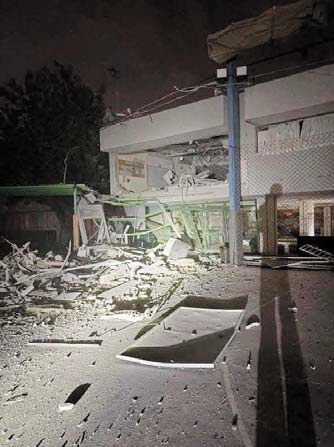In a bold and calculated move, Yemeni forces preempted an Israeli attack that had been weeks in the making, according to Israeli military sources. This unexpected counterstrike not only disrupted Israel’s plans but also demonstrated Yemen’s growing military prowess and intelligence capabilities.
Israeli Offensive Derailed by Yemeni Precision
The planned Israeli offensive was significantly curtailed after Yemeni forces launched a preemptive attack while the enemy aircraft was airborne. The timing and accuracy of the Yemeni strike left Zionist officials scrambling to explain how Yemen had anticipated the assault so precisely.
Likewise in mid-November, Yemeni forces launched an unexpected attack on the "USS Abraham Lincoln" aircraft carrier as it entered the Arabian Sea. The strike also targeted its escort fleet, including two destroyers near the Bab al-Mandeb Strait. The operation forced the U.S. to delay a coordinated plan involving over 200 airstrikes on Yemen’s capital, Sana’a, and other regions. According to Yemeni military sources, the enemies aerial campaign intended to pave the way for a ground invasion by mercenaries, akin to tactics used in Syria.
Coordinated Strikes Across Theaters
That same night, Yemen fired a hypersonic missile at central occupied Palestine, striking sensitive military targets near Yaffa. "Israeli Channel 14" reported that the missile hit its target at precisely 2:45 AM, as adversary jets were operating. Yemen’s armed forces confirmed they had used Palestine-2 hypersonic missiles, each traveling at speeds exceeding Mach 16, to strike two critical military sites. Images released under Zionist military censorship revealed destroyed buildings, shattered vehicles, and extensive damage. The simultaneous timing of these strikes highlighted the Israeli entity’s vulnerability and intelligence gaps.
A Series of Strategic Surprise Offensives
Yemen’s leadership has continually surprised its adversaries with calculated moves and precise targeting. In September 2024, the Yafa Drone targeted an apartment in occupied Yaffa, forcing Israeli authorities to impose a media blackout. This followed a similar strike by the Yavne Drone in southern Palestine, which also targeted sensitive locations. These operations have exposed Yemen’s deep intelligence penetration into the entity's defense networks.
Yemeni sources emphasized that Thursday’s preemptive strike was executed with full knowledge of Israel’s planned assault. Zionist Defense Minister Yisrael Katz acknowledged that the attack had been in preparation for weeks, but Yemeni missiles struck their targets before their planes could reach them.
Strategic Challenges posed on the Entity and its Allies
The Yemeni theater presents unique challenges for the Isreali entity and its allies. Yemen’s distanced geography, cohesive leadership, and popular support for the Palestinian cause make it a formidable oppostion. Yemeni leadership has shown a willingness to strike high-value targets without traditional constraints, and its forces have repeatedly demonstrated their capability to disrupt adversarial plans.
Yemen’s expansive terrain, particularly its mountainous regions, complicates foreign military operations. Airstrikes face limited effectiveness against well-hidden military assets, while ground operations risk becoming prolonged and costly. The Yemeni population’s resilience, forged through years of conflict, further bolsters the country’s defensive capabilities.
Regional and Global Implications
The potential for a broader military campaign against Yemen relies heavily on U.S. and NATO support, as regional allies remain hesitant. American carriers like the "USS Roosevelt" and "Abraham Lincoln" have already been targeted by Yemeni forces, compelling them to maintain safer distances. Ground operations appear even less feasible, given the high costs and the proven inability of the exhausted mercenary forces to confront AnsarAllah fighters.
The Yemeni leadership’s strategic approach since its declaration of support for the al-Aqsa Flood operation has redefined regional dynamics. By maintaining constant domestic mobilization and leveraging its geographical advantages, Yemen has shattered long-standing assumptions about the balance of power in the Middle East.
Yemen’s Unyielding Resolve
The latest Yemeni operation carries significant implications for the Zionist entity, the U.S., and NATO. The preemptive strike not only demonstrated Yemen’s intelligence capabilities and military precision but also revealed vulnerabilities in adversary strategies.
For the entity, the conflict has proven more challenging than anticipated. Yemen’s ability to strike sensitive targets within occupied territories underscores a shift in the regional balance of power. As Tel Aviv grapples with its miscalculations, the risk of further escalation looms.
Conclusion: A New Era of Resistance
Yemen’s actions have once again demonstrated its resilience and strategic power. The nation’s history of defying empires serves as a stark reminder to those who underestimate its capabilities. With the ongoing conflict revealing the limits of Zionist and Western power, Yemen is reshaping the geopolitical landscape, standing firm as a decisive player in the region.







